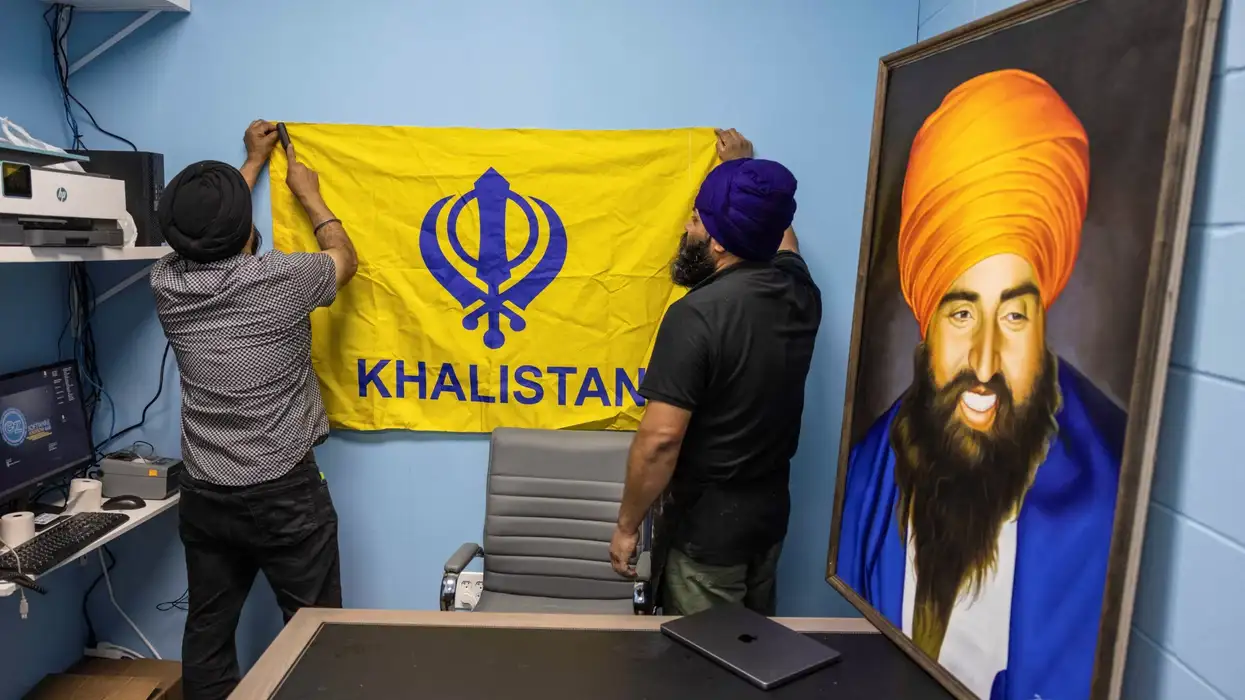Dr Jasmeet Bains, the first Sikh American elected to the California assembly, is accustomed to challenging situations as a physician specialising in addiction. However, she was surprised when four men entered her office in August last year, shortly after California adopted her resolution declaring the 1984 killing of thousands of Sikhs in India a genocide. The men, who appeared to be of Indian origin, warned they would "do whatever it takes to go after you," according to Bains.
This incident marked the beginning of a series of threats. Since last summer, Bains has received over 100 threatening text messages. She has observed someone taking photos of her Bakersfield home from a parked truck, and her mailbox lock has been broken multiple times.
Bains reported the incidents to the local police and notified the state assembly Sergeant-at-Arms about the surveillance of her home. Reuters did not review the text messages.
In late September, after Canadian prime minister Justin Trudeau stated his government had credible evidence linking the Indian government to the killing of a Sikh separatist leader in British Columbia, Bains said the Sergeant-at-Arms conducted a security assessment at her home and advised her to take precautions. In October, the FBI reached out to her regarding the threats.
As a result, Bains has started screening phone calls and avoiding travelling alone. She occasionally requests security while attending official events. "My life has changed," she told Reuters. "I don't go anywhere alone anymore. I make sure my staff is with me at all times, which is hard for someone as independent as me."
Reuters spoke to 19 Sikh community leaders, including three elected US officials, who reported being targeted with threats and harassment in the United States and Canada over the past year. This has occurred even as law enforcement agencies investigate the killing of a Sikh separatist leader in Canada and an attempted assassination of another separatist leader in the US.
The Sikh leaders described experiences of online harassment, surveillance at their homes and places of worship, doxxing, and "swatting," which involves filing false police reports to elicit a law enforcement response.
Seven Sikh activists told Reuters that the FBI or the Royal Canadian Mounted Police had warned them last year that their lives could be in danger, although the specific sources of the threats were not disclosed.
An FBI official stated the bureau issues such warnings when credible evidence of a threat is received but did not comment further. Canadian federal police declined to confirm how many individuals were issued warnings.
The FBI also alerted the Sikh community about "transnational repression," which involves a foreign state intimidating or threatening political opponents in another country. It released a public service announcement in Punjabi urging people to report threats or harassment and held two invitation-only meetings for Sikh advocacy groups.
US and Canada investigate
In Canada, four Indian nationals face charges of murder and conspiracy in connection with the June 2023 shooting of Sikh separatist Hardeep Singh Nijjar outside his gurdwara in Surrey, British Columbia. Attorneys for the four men did not respond to requests for comment.
Separately, the US Justice Department charged Indian national Nikhil Gupta with attempting to arrange the murder of separatist leader Gurpatwant Singh Pannun at the direction of an Indian intelligence official. Gupta pleaded not guilty and is awaiting trial in New York. His attorney declined to comment.
India has denied any involvement in Nijjar's killing or the attempted assassination of Pannun. The Indian government has pledged to investigate the plot against Pannun, but not Nijjar. "Nijjar was someone who was a designated terrorist," Sanjay Kumar Verma, India's high commissioner to Canada, told Reuters in an interview in June. "For him I have no love lost."
Many of the threats described to Reuters by Sikh activists came from anonymous accounts on X. Others were received from unknown phone numbers and anonymous text messages, the activists said.
Reuters could not determine the sources of the threats.
At least six activists suspect that India's government or its supporters may be behind the harassment, though they acknowledged that proving this is difficult, especially when threats come from anonymous sources.
Kanwarpal Singh, political secretary of the Punjab-based Dal Khalsa group, which advocates for a separate state, accused Indian prime minister Narendra Modi's government of attempting to defame and isolate Sikh separatists without specifying whether he was referring to those in India or abroad.
The Indian embassy in Washington and Modi's office did not respond to repeated requests for comment. Verma did not respond to questions regarding threats against Sikh separatists and other activists or the criminal cases in Canada and the United States.
In a call with Reuters, two FBI officials who spoke on condition of anonymity did not directly address India's potential role in transnational repression. One said they "look across a really broad range of aggressive countries." They added that determining whether threats originate from a foreign government or criminal elements using similar tactics can be challenging.
Pannun continues to receive violent threats online, even after the Justice Department publicised the assassination plot last November. In a May 7 email in Hindi reviewed by Reuters, a threat stated, "Wherever you run, I will come there, enter it and kill you."
In April, the X account @randomatheist_ wrote to Pannun, stating, "Polonium-210 arrived in DC," referencing the toxic radioactive isotope used to kill former Russian spy Alexander Litvinenko.
Pannun's organisation, Sikhs for Justice, has a Washington, DC office. He referred further questions about the threats to US law enforcement.
In 2019, India designated Sikhs for Justice an unlawful association, citing its involvement in extremist activities. Pannun and 15 other members of the organisation faced terrorism-related charges a year later, including allegations of attempting to incite a mutiny in the Indian army. Pannun denies these allegations.
Pritpal Singh, a founder of the American Sikh Caucus Committee, which supports secession, also told Reuters that threats and surveillance persisted after he received an FBI warning last June. Shortly after the warning, he observed a strange car surveilling his California home and noted a second instance of surveillance in November. These episodes were recorded by home security cameras and reviewed by Reuters. Pritpal reported the surveillance to the FBI.
On the June 18 anniversary of Nijjar's killing, one account on X wrote in Hindi that it was time to "plan your murder." Another account wrote, "RIP Pritpal." Reuters saw screenshots of both messages, which his family reported to the FBI.
A kind of worst-case scenario
Nate Schenkkan, senior director of research at the Washington, DC non-profit Freedom House, described the situation as "a kind of worst-case scenario for transnational repression — when a major state acts completely outside the law using all the tools at its disposal to silence dissent in another country." He pointed out that India seems to disregard the potential diplomatic, legal, and political consequences of its actions, referencing the ongoing prosecutions in the US and Canada.
Harjap Singh Japhi, a grocery store owner in Greenwood, Indiana, who was charged by India with terrorism-related crimes for his involvement with Sikhs for Justice, told Reuters that FBI agents visited his home in the fall of 2022 to inquire about his possible connection to a bombing in the late 1980s. The agents informed him that India had provided the bureau with records related to the attack, which Japhi claimed he was too young to recall.
Japhi's wife, Rajvinder Shokar, also confirmed the FBI's visit. FBI officials stated they could not comment on Japhi's case, and Reuters could not independently verify his account of the bombing or the FBI's visit.
False referrals are common in transnational repression cases, according to the FBI, which is collaborating with local law enforcement agencies on how to scrutinise such referrals, especially when the target is a political opponent.
The day after Nijjar's killing, Japhi received an anonymous phone call from someone claiming to be part of an Indian organised crime group, warning him he was next. In December, a since-deleted X account doxxed Japhi by posting his residential and business addresses and local health department inspection records online, as indicated by screenshots shared with Reuters.
Japhi reported the threatening phone call and doxxing to the FBI.
Bains expressed uncertainty about whether she is experiencing transnational repression from the Indian government. In May, the California Assembly passed a bill she introduced to train state law enforcement to identify and respond to transnational repression. "If I'm experiencing it, more people are experiencing it," she said. "And that impacts everyone, not just the Sikh community."
(Reuters)












